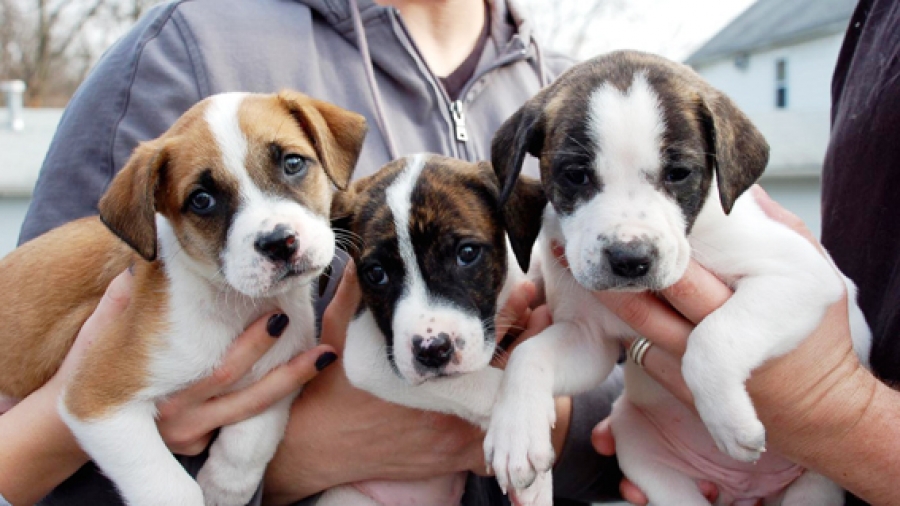Raising newborn puppies
Wednesday 22 June 2022 | Written by Supplied | Published in Opinion, Pet Talk

Photo: COOK ISLANDS NEWS/16090815
New pups are often scared of their new surroundings. Children are likely to be excited, but too much noise and attention can scare the pup more, writes Dr Michael Baer of Te Are Manu Vet Clinic.
They are very sweet. They can’t open their eyes, which are sealed over to finish developing. They can move, by wriggling not crawling. Somehow, blind and despite the effort of littermates, they manage to find their way to milk and latch on and start to feed. Thank goodness because their voices are much louder than their size. Milk keeps them quiet.
Puppies, kittens, kids, piglets, calves – babies of different kinds – are cute, cuddly, and loveable. Cared for by doting mothers, it is hard not to feel drawn to them.
The very young are reliant on adults. Even guinea pigs, which are born as near adults need their mothers. They need colostrum as their first meal. It provides newborns with their immune system, and the perfect meal to begin growing.
Over the first couple days, colostrum becomes milk. Less packed with immunity, it is still the perfect diet for the undeveloped gut of our little friends. It provides a constant in a diet that changes quickly as the young explore the world, often trying to eat things that would scare an adult.
As the caretakers of the mothers and offspring, humans should do everything to help these babies grow into healthy adults. And it isn’t difficult. A few simple steps in and we have healthy, well grown, well-behaved animals. We will look at pups as the example, but the principles are the same for all.
Mum needs food, plenty of it. While producing milk she needs two to three times more than normal – another reason to desex her before she gets pregnant. If she is underfed, so are the puppies. And she needs good food, which means protein and fat and in the right balance with minerals and vitamins.
Puppies need food too. Feeding commercial puppy food from about two weeks old helps change their gut so they can be weaned. Soft food initially, then dry biscuits. The chemical and physical changes take time, so an early start will result in less of a shock at weaning. Sudden changes of diet at weaning are one challenge but the social changes are another. The pup is taken away from mum. It goes to a new home, often alone, separated for the first time from littermates.
As the new owners, we can make things easier and continuing with the same food helps. If we want to feed something different it still pays to start out with what the pup has been eating and then change slowly, substituting part of the old type of food for some of the new type. Slowly. A mix of one quarter new, three quarters old becomes half and half and then three quarters one quarter. Then the change is complete.
The social change needs a similarly patient approach. New pups are often scared of their new surroundings. Children are likely to be excited, but too much noise and attention can scare the pup more. Starting out as we mean to continue is important. We should teach pups what they can and cannot do, and not let pups do what adults can’t. We should play with our puppies and train them to do what we ask of them. We should ensure they get plenty of sleep and learn where they can go to the toilet. And we should look after their health.
Gut worms attach to the gut lining and hold on, causing damage to our pup’s intestines. Many worms absorb their food from what is passing them by. This is bad enough, and diarrhoea is often the result. But others, like hook worms, live off the puppy’s blood. In bad cases of hook worm puppies lose so much blood they become anaemic. Sometimes only a blood transfusion can save them. Sometimes a blood transfusion is not enough; and they die. We need to worm puppies every two weeks from the age of two weeks.
Fleas drink blood too, and cause itchy-bites. They also spread tapeworms, to dogs and to us. Spot-on flea treatments can be given from 6-8 weeks of age. Younger puppies can be sprayed with a flea killer at Te Are Manu clinic.
Once puppies are about three months old, they should have settled into their new homes, and we should get them desexed. The surgery can be done at the TAM clinic or at a DRACC Puna Desexing days, like the one in Akaoa today. Once our puppy is desexed we can take the next step in responsible pet ownership and get it registered.














































